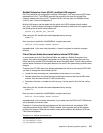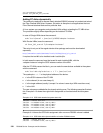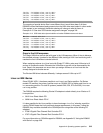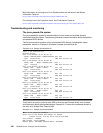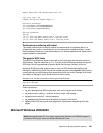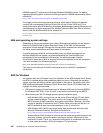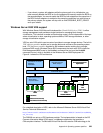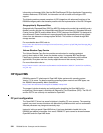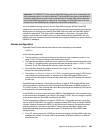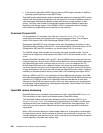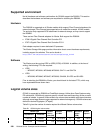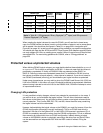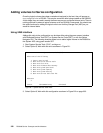
Appendix A. Operating systems specifics 325
You must dedicate storage ports for only the OpenVMS host type. Multiple OpenVMS
systems can access the same port. Appropriate zoning must be enforced from the beginning.
Wrong access to storage ports used by OpenVMS hosts may clear the OpenVMS-specific
settings for these ports. This might remain undetected for a long time—until some failure
happens, and by then I/Os might be lost. It is worth mentioning that OpenVMS is the only
platform with such a restriction (usually, different open systems platforms can share the same
DS6000 FC adapters).
Volume configuration
OpenVMS Fibre Channel devices have device names according to the schema:
$1$DGA<n>
with the following elements:
The first portion $1$ of the device name is the allocation class (a decimal number in the
range 1–255). FC devices always have the allocation class 1.
The following two letters encode the drivers where the first letter denotes the device class
(
D = disks, M = magnetic tapes) and the second letter the device type (K = SCSI, G = Fibre
Channel). So all Fibre Channel disk names contain the code
DG.
The third letter denotes the adapter channel (from range A to Z). Fibre Channel devices
always have the channel identifier
A.
The number <n> is the User-Defined ID (UDID), a number from the range 0–32767 which
is provided by the storage system in response to an OpenVMS-special SCSI inquiry
command (from the range of command codes reserved by the SCSI standard for vendor’s
private use).
OpenVMS does not identify a Fibre Channel disk by its path or SCSI target/LUN like other
operating systems. It relies on the UDID. Although OpenVMS uses the WWID to control all
FC paths to a disk, a Fibre Channel disk which does not provide this additional UDID cannot
be recognized by the operating system.
In the DS6000, the volume name acts as the UDID for OpenVMS hosts. If the character string
of the volume name evaluates to an integer in the range 0–32767, then this integer is replied
as the answer when an OpenVMS host asks for the UDID.
The DS management utilities do not enforce UDID rules. They accept incorrect values that
are not valid for OpenVMS. It is possible to assign the same UDID value to multiple DS6000
volumes. However, because the UDID is in fact the device ID seen by the operating system,
several consistency rules have to be fulfilled. These rules are described in detail in the
OpenVMS operating system documentation (see
HP Guidelines for OpenVMS Cluster
Configurations
):
Every FC volume must have a UDID that is unique throughout the OpenVMS cluster that
accesses the volume. The same UDID may be used in a different cluster or for different
stand-alone host.
Important: The DS6000 FC ports used by OpenVMS hosts must not be accessed by any
other operating system, not even accidentally. The OpenVMS hosts have to be defined for
access to these ports only, and it must be ensured that no foreign HBA (without definition
as an OpenVMS host) is seen by these ports. Conversely, an OpenVMS host must have
access only to the DS6000 ports configured for OpenVMS compatibility.



